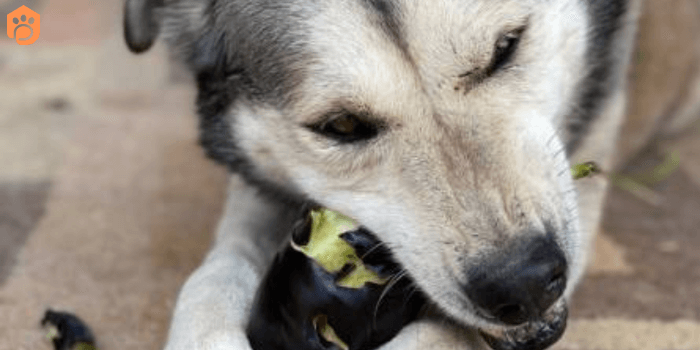Can Dogs Eat Eggplant? Discover the Benefits and Risks!
When it comes to our beloved dogs, we always strive for the best – especially when it comes to their diet. As a mindful dog owner, you might ask, can dogs eat eggplant? This nutritious vegetable, often included in human diets, requires caution when shared with dogs. Eggplant, or aubergine, is a healthy vegetable often included in human diets. Still, pet owners should proceed with caution when feeding eggplant to dogs.
Before you include eggplant in your dog’s meals, it’s crucial to ask: ‘can dogs eat eggplant safely?’ considering factors such as the dog’s overall health, potential allergies and the correct way to prepare the vegetable to ensure it is safe for your dog to eat.
Key Takeaways
- Moderation is Crucial: Before adding eggplant to your dog’s food, it’s important to understand that dogs eat eggplant. While it’s good for them, you should only give a little to avoid upsetting their stomach.
- Preparation Matters: “Can dogs eat eggplant?” is a common question among pet owners. The answer depends on how the vegetable is prepared. Proper cooking is crucial, as raw eggplant can potentially harm dogs.
- Beware of Allergies: While ‘Can dogs eat eggplant’ is a valid question, be aware of the potential risks, including allergies and sensitivities. Some dogs may have or develop an allergy to eggplant, so it’s important to introduce it to their diet slowly and observe for any adverse reactions.
- Avoid Seasonings: When preparing eggplant for dogs, do not add seasonings, oils, or sauces that can harm them.
- Not for Every Dog: Dogs with pre-existing health conditions, particularly those related to the kidney or bladder, should avoid eggplant due to its oxalate content.

Nutritional Value of Eggplant
When investigating whether dogs eat eggplant, it’s good to know that this vegetable is full of nutrients, such as vitamins and minerals, that are good for dogs. Here’s a breakdown of the nutritional content of eggplant:
- Fiber: Promotes healthy digestion and bowel regularity in dogs.
- Vitamin B6: Essential for glucose generation, nervous system function, and hormone regulation.
- Vitamin C: An antioxidant that helps in reducing inflammation and cognitive aging.
- Potassium: Important for maintaining proper fluid balance in nerve and muscle functions.
- Manganese: Plays a role in bone formation, blood clotting, and reducing inflammation.
- Antioxidants: It contains nasunin, an antioxidant that helps protect cells from damage, though the exact benefits for dogs are unclear.
While eggplant can be a nutritious addition to a dog’s diet, it’s crucial to remember that these benefits are only attainable when prepared and served correctly, considering all previously mentioned precautions.
Benefits of Eggplants for Dogs
Including eggplants in your dog’s diet can offer several health benefits, thanks to its nutritional content:
- Digestive Health: With its high fiber content, eggplant can help regulate your dog’s digestive system, promoting healthy bowel movements and preventing constipation.
- Immune System Boost: Vitamin C in eggplant is known for bolstering the immune system, which can help your dog fight off infections and diseases.
- Heart Health: The eggplant’s potassium helps manage your dog’s heart rate and blood pressure, supporting overall cardiovascular health.
- Neurological Benefits: Vitamin B6 plays a crucial role in your dog’s cognitive and nervous system health, which is vital for dogs of all ages, particularly seniors.
- Antioxidant Properties: Eggplants contain various antioxidants that may help in protecting your dog’s cells from oxidative damage, although the full extent of these benefits for dogs still requires more research.

Risks and Concerns
Despite the health benefits, there are potential risks when introducing eggplant to dogs:
- Allergies and Sensitivities: Dogs, like humans, can be allergic to any food. Watch for signs of allergic reactions like itching, skin rashes, or gastrointestinal upset.
- Digestive Issues: Although eggplant’s fiber content is beneficial, it can sometimes cause digestive problems. Introduce it slowly and watch for any signs of stomach distress.
- Toxicity Concerns: Eggplant belongs to the nightshade family, which contains compounds that can be harmful if ingested in large quantities. Moderation is key.
- Kidney Stone Consideration: Due to its oxalate content, eggplant might contribute to the formation of kidney stones in susceptible dogs. If your dog has a history of kidney stones, it’s especially important to consult your vet before adding eggplant to their diet.
Solanine Poisoning
‘Can dogs eat eggplant?’ also raises awareness of the risks of solanine poisoning, which require monitoring and moderation.
Eggplant contains solanine, a chemical compound found in varying degrees in all nightshade family members, and can be toxic to some dogs if consumed in large amounts. Typical symptoms of solanine poisoning include:
- Gastrointestinal Upset: Nausea, vomiting, diarrhea, and abdominal pain may occur.
- Neurological Issues: Overconsumption can lead to neurological disorders, including tremors, seizures, and confusion.
- Respiratory Problems: In severe cases, difficulty breathing may arise due to solanine’s impact on the nervous system.
- Cardiac Effects: Changes in heart rate can also be a concerning symptom of solanine toxicity.
Monitoring your dog’s reaction after offering eggplant and seeking immediate veterinary assistance if you suspect solanine poisoning is essential. When including eggplant in your pet’s diet, always do so under the guidance of a professional and in moderation to avoid any adverse effects.

Can Dogs Eat Raw Eggplant?
It’s generally not recommended to let dogs eat raw eggplant. This vegetable can be harsh on a dog’s digestive system, and the solanine content is higher in its raw form, which could potentially lead to toxicity.
Therefore, if you’re considering adding eggplant to your dog’s diet, it’s best to cook it first. Cooking breaks down some of the solanine and makes the eggplant easier for dogs to digest. Remember to serve the cooked eggplant plain, without any added oils, spices, or seasonings that could harm your dog.
Related: Can Dogs Eat Guava?
Can Dogs Eat Eggplant Leaves?
Though not widely discussed, eggplant leaves are part of the plant and belong to the nightshade family. Like the rest of the plant, they contain solanine, potentially at higher levels.
Dogs are strongly advised not to eat eggplant leaves. The reason for this is the higher concentration of solanine and other potentially harmful alkaloids in the foliage, which can pose a greater risk for solanine poisoning than the fruit itself.
Symptoms of solanine toxicity from consuming leaves might be more severe and onset more rapidly. Therefore, always keep eggplant leaves out of your dog’s reach and ensure their safety by only offering the safely prepared fruit, as previously detailed.
Can Dogs Eat Eggplant with Egg?
Dogs can eat eggplant with eggs as part of their meal. Eggs are a rich source of protein, riboflavin, and selenium, making them beneficial for your dog’s health.
However, ensuring that the eggplant and the eggs are cooked thoroughly without any seasoning, oils, or spices is crucial. The best way to serve dogs is boiled or scrambled eggs without butter or oil, which helps avoid unnecessary fats. When properly prepared, this combination of eggplant and eggs can be a healthy addition to your dog’s diet.
Here’s how to safely incorporate eggplant with egg into your dog’s diet:
- Moderation is Key: Serve small portions of eggplant with eggs only as an occasional treat, not a regular part of their diet.
- Avoid Seasoning: Ensure that both the egg and eggplant are plain and free from garlic, onions, salt, or any other spices that can be toxic to dogs.
- Proper Preparation: Cook the eggplant until it’s soft to aid digestion, and cook eggs thoroughly to reduce the risk of salmonella.
- Monitoring: Watch for any unusual signs after your dog consumes this mix, as some canines may have a sensitive stomach or allergies.
While this combination can offer additional nutritional benefits, it’s another instance where your dog’s preferences and specific dietary needs should dictate whether eggplant and egg make a healthy choice for them. Before adding new foods to your pet’s diet, make sure to consult with your veterinarian.
Can Dogs Eat Eggplant and Tomatoes?
Dogs eat eggplant, but it’s important to note that tomatoes are generally considered safer due to their lower levels of solanine when they’re ripe and red. However, caution is still required. Ripe tomatoes, without the stems or leaves, should be given in moderation.
Also, always observe your dog for any adverse reactions after they eat these foods. Before introducing new foods like eggplant or tomatoes into your dog’s diet, it’s essential to consult with a vet. This precaution ensures their health and well-being.
Related: Can Dogs Eat Sauerkraut?

How Should I Prepare Eggplant for My Dog?
When preparing eggplant for your dog, it’s essential to follow these steps to ensure it’s safe and healthy for consumption:
- Wash Thoroughly: Always wash the eggplant under running water to remove any pesticides or contaminants on the skin.
- Peel and Slice: Some dogs may have difficulty digesting the skin, so peeling the eggplant is advisable. Cut it into small, digestible slices or cubes.
- Cook Completely: Raw eggplant contains more solanine, so it’s important to cook it thoroughly to reduce this compound’s presence. Steaming or boiling are good methods as they don’t require any harmful additives.
- Avoid Seasonings: Do not use any seasoning, especially onions, garlic, or salt, as these can be toxic to dogs.
- Introduce Gradually: Start by feeding your dog a small amount of eggplant to ensure no adverse reactions or allergies to the vegetable.
Taking the time to prepare eggplant properly can make it a safe and enjoyable treat for your canine friend.

Recommended Serving Sizes and Frequency
When offering eggplant to your dog, moderation is crucial to avoid potential health issues. Here are the recommended serving sizes and frequency:
- Serving Sizes: Small dogs should have a couple of small cubes, equivalent to about a tablespoon, while larger breeds can be offered up to a quarter cup of cooked eggplant.
- Frequency: Give eggplant as an occasional treat, not a regular part of the diet. Start with a safe frequency of once a week, allowing owners to monitor their dog’s reaction to the new food.
Always observe your dog after feeding it eggplant for the first time to ensure it does not exhibit any negative reactions or signs of discomfort. If you have any concerns about serving sizes or frequency, consult your veterinarian for advice tailored to your dog’s health needs and diet.

Alternatives and Variety
If you discover eggplant isn’t the right fit for your pet, numerous other dog-friendly vegetables, such as carrots, green beans, and pumpkin, can offer similar nutritional benefits. Remember, a variety in your dog’s diet can help balance their nutrition and keep meals exciting.
Other Dog-Friendly Vegetables to Consider
In addition to carrots, green beans, and pumpkin, other vegetables can be safely incorporated into your dog’s diet, contributing to their overall health and well-being. Some of these include:
- Sweet Potatoes: Rich in dietary fiber and vitamins A and C, sweet potatoes can be a healthy, sweet dog treat when cooked and served in moderation.
- Peas: Peas are an excellent source of protein, vitamins, and minerals and can be added to your dog’s meals or given as a treat.
- Cucumbers: Low in calories and high in water content, cucumbers can be a refreshing and crunchy snack, particularly beneficial for overweight dogs.
- Zucchini: This vegetable is safe for dogs and provides vitamin C, potassium, and fiber to aid digestion.
When introducing new vegetables to your dog’s diet, remember to start with small amounts to ensure they don’t have any adverse reactions. Consulting with your veterinarian is always the best practice before making dietary changes.
Why Dogs Need a Diet, That’s Balanced and Diverse
A balanced and varied diet is fundamental to a dog’s health and life. Much like humans, dogs require a diverse range of nutrients to support their bodily functions. Proteins, carbohydrates, fats, vitamins, and minerals are essential in maintaining energy levels, muscle growth, immune system function, and overall well-being.
Achieving nutritional balance is best accomplished through a well-rounded feeding routine that includes a variety of safe and appropriate foods; a monotone diet cannot achieve this.
Therefore, incorporating dog-safe vegetables, fruits, and high-quality proteins and carbohydrates can contribute to a longer and healthier life for our canine companions. Always consult a veterinarian to develop a diet tailored to your dog’s needs, age, size, and activity level.
For a comprehensive list of fruits and vegetables that dogs can and can’t eat, check out the AKC’s guide.
FAQs
Are Eggplants Toxic to Dogs?
Eggplants, also known as aubergines, can be toxic to dogs in large quantities due to the presence of solanine. Some dogs may tolerate small, cooked portions, while others may have allergic reactions or upset stomachs. Introduce eggplant slowly and in moderation, cooked and without seasonings. Monitor your dog for signs of distress and consult a veterinarian before adding eggplant to their diet.
Can Dogs Eat Eggplant Skin?
Dogs eat eggplant, but caution is urged due to potential digestion issues caused by the skin. The skin contains solanine, which can exacerbate symptoms in sensitive dogs. It would help to peel the eggplant before feeding it to your dog. Always monitor your pet closely after introducing new foods and consult a vet with any concerns.
Can Dogs Eat Eggplant Seeds?
Dogs eat eggplant seeds that are safe for them in small quantities and do not contain harmful toxins. However, moderation is key in feeding them to dogs. Large amounts of eggplant, including the seeds, can cause gastrointestinal upset. Cook eggplant without seasonings and consult a veterinarian for guidance on feeding eggplant seeds to your dog.
Can Dogs Have an Allergic Reaction to Eggplant?
Dogs eat eggplant, but it’s crucial to be aware that they can have allergic reactions to it, although this is not common. Symptoms may include itching, rashes, and gastrointestinal or respiratory issues. If these signs are observed, you should stop feeding your dog eggplant and consult a vet immediately.
How Much Eggplant Can I Safely Feed My Dog?
Determining safe eggplant amounts for dogs depends on their size and tolerance. Small dogs can have a tablespoon of cooked, small cubes, while larger dogs can handle up to a quarter cup. When introducing eggplant, start with less. Offer eggplant occasionally, not as a staple, with once a week as a good frequency. Monitor your dog for reactions and consult a vet for personalized advice.
Are there any vegetables that are safer alternatives to eggplant for dogs?
Certain vegetables serve as safer alternatives to eggplant for dogs. These include carrots, broccoli (in small quantities), Brussels sprouts, and cooked squash (like butternut or acorn squash). Introducing new vegetables in small amounts without any added seasonings or oils is important. Consulting with your veterinarian is recommended to ensure optimal nutrition for your dog.
How Much Eggplant is Safe for My Dog?
Moderation is important for your dog’s safety and enjoyment when feeding it eggplant. Small dogs can start with a tablespoon of cooked, unseasoned eggplant, while larger dogs can handle up to a quarter cup. Introduce eggplant gradually and limit it to an occasional treat. Consult your veterinarian for personalized advice.
Can Puppies Eat Eggplant?
During their growth stage, puppies have specific nutritional needs and delicate digestive systems, so it’s important to introduce new foods like eggplant cautiously. Consult a veterinarian before adding eggplant to a puppy’s diet; start with small amounts, remove the skin and seeds, and monitor for digestive issues. Prioritize a diet specifically for puppies, and use treats sparingly.
Conclusion
Eggplant can be a healthy treat option for dogs, provided it is prepared correctly and in moderation. Always pay close attention to how your dog responds to new foods and consult with your veterinarian if you have any concerns regarding dog nutrition, particularly regarding safe dog treats and potential dog allergies or digestive issues. Remember, whether you offer eggplant or another type of vegetable or stick to professional dog treats, establish the best diet for your dog with input from a professional who understands your furry family member’s unique needs and fulfills their nutritional requirements. Consult your veterinarian to navigate the expansive dog food world for a happy, healthy canine life.






